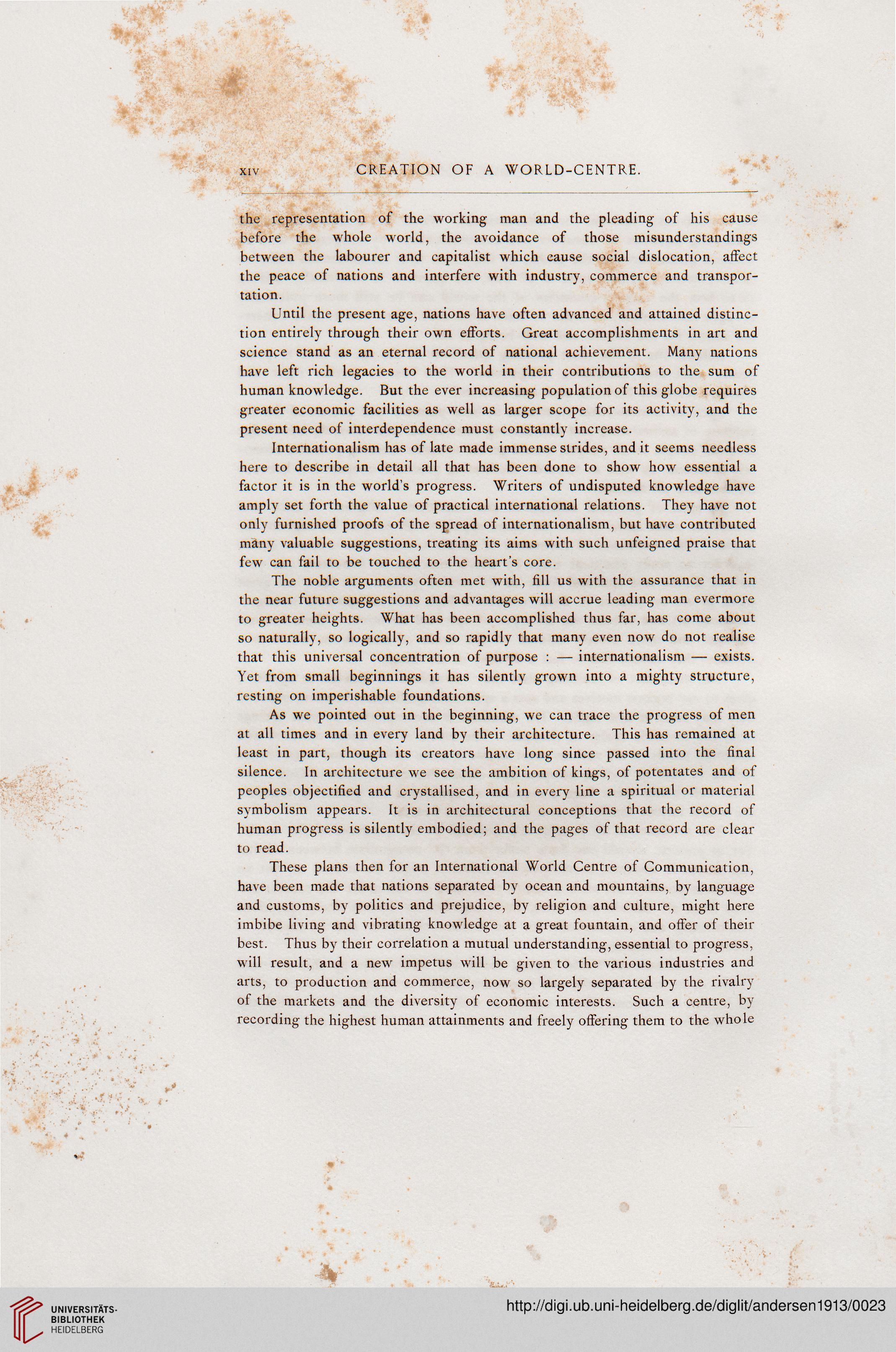XIV
CREATION OF A WORLD-CENTRE.
the representation of the working man and the pleading of his cause
before the whole world, the avoidance of those misunderstandings
between the labourer and capitalist which cause social dislocation, affect
the peace of nations and interfere with industry, commerce and transpor-
tation.
Until the present age, nations have often advanced and attained distinc-
tion entirely through their own efforts. Great accomplishments in art and
science stand as an eternal record of national achievement. Many nations
have left rich legacies to the world in their contributions to the sum of
human knowledge. But the ever increasing population of this globe requires
greater economic facilities as well as larger scope for its activity, and the
present need of interdependence must constantly increase.
Internationalism has of late made immense strides, and it seems needless
here to describe in detail all that has been done to show how essential a
factor it is in the world's progress. Writers of undisputed knowledge have
amply set forth the value of practical international relations. They have not
only furnished proofs of the spread of internationalism, but have contributed
many valuable suggestions, treating its aims with such unfeigned praise that
few can fail to be touched to the heart's core.
The noble arguments often met with, fill us with the assurance that in
the near future suggestions and advantages will accrue leading man evermore
to greater heights. What has been accomplished thus far, has come about
so naturally, so logically, and so rapidly that many even now do not realise
that this universal concentration of purpose : — internationalism — exists.
Yet from small beginnings it has silently grown into a mighty structure,
resting on imperishable foundations.
As we pointed out in the beginning, we can trace the progress of men
at all times and in every land by their architecture. This has remained at
least in part, though its creators have long since passed into the final
silence. In architecture we see the ambition of kings, of potentates and of
peoples objectified and crystallised, and in every line a spiritual or material
symbolism appears. It is in architectural conceptions that the record of
human progress is silently embodied; and the pages of that record are clear
to read.
These plans then for an International World Centre of Communication,
have been made that nations separated by ocean and mountains, by language
and customs, by politics and prejudice, by religion and culture, might here
imbibe living and vibrating knowledge at a great fountain, and offer of their
best. Thus by their correlation a mutual understanding, essential to progress,
will result, and a new impetus will be given to the various industries and
arts, to production and commerce, now so largely separated by the rivalry
of the markets and the diversity of economic interests. Such a centre, by
recording the highest human attainments and freely offering them to the whole
CREATION OF A WORLD-CENTRE.
the representation of the working man and the pleading of his cause
before the whole world, the avoidance of those misunderstandings
between the labourer and capitalist which cause social dislocation, affect
the peace of nations and interfere with industry, commerce and transpor-
tation.
Until the present age, nations have often advanced and attained distinc-
tion entirely through their own efforts. Great accomplishments in art and
science stand as an eternal record of national achievement. Many nations
have left rich legacies to the world in their contributions to the sum of
human knowledge. But the ever increasing population of this globe requires
greater economic facilities as well as larger scope for its activity, and the
present need of interdependence must constantly increase.
Internationalism has of late made immense strides, and it seems needless
here to describe in detail all that has been done to show how essential a
factor it is in the world's progress. Writers of undisputed knowledge have
amply set forth the value of practical international relations. They have not
only furnished proofs of the spread of internationalism, but have contributed
many valuable suggestions, treating its aims with such unfeigned praise that
few can fail to be touched to the heart's core.
The noble arguments often met with, fill us with the assurance that in
the near future suggestions and advantages will accrue leading man evermore
to greater heights. What has been accomplished thus far, has come about
so naturally, so logically, and so rapidly that many even now do not realise
that this universal concentration of purpose : — internationalism — exists.
Yet from small beginnings it has silently grown into a mighty structure,
resting on imperishable foundations.
As we pointed out in the beginning, we can trace the progress of men
at all times and in every land by their architecture. This has remained at
least in part, though its creators have long since passed into the final
silence. In architecture we see the ambition of kings, of potentates and of
peoples objectified and crystallised, and in every line a spiritual or material
symbolism appears. It is in architectural conceptions that the record of
human progress is silently embodied; and the pages of that record are clear
to read.
These plans then for an International World Centre of Communication,
have been made that nations separated by ocean and mountains, by language
and customs, by politics and prejudice, by religion and culture, might here
imbibe living and vibrating knowledge at a great fountain, and offer of their
best. Thus by their correlation a mutual understanding, essential to progress,
will result, and a new impetus will be given to the various industries and
arts, to production and commerce, now so largely separated by the rivalry
of the markets and the diversity of economic interests. Such a centre, by
recording the highest human attainments and freely offering them to the whole





